Hospitality Operations Management Report: Corinthia Hotel Analysis
VerifiedAdded on 2020/12/24
|14
|4656
|135
Report
AI Summary
This report provides a detailed analysis of hospitality operations management, using the Corinthia Hotel London as a case study. It begins by examining the nature of various hospitality products and services, including perishable, tangible, and intangible elements, and then evaluates the influences on demand patterns, such as seasonality, time of week, and cultural factors. The report compares customer profiles, considering pricing considerations and meal experiences, and analyzes factors affecting Average Spending Power (ASP), including income levels and economic conditions. Furthermore, it assesses the key stages in product and service development, from idea generation to commercialization, and explores how features like brand image and service style contribute to customer perception. The report also discusses opportunities and constraints in product and service development, evaluating pricing methods and factors influencing revenue generation and profitability. Finally, it applies performance measures and appraisal techniques to various aspects of hospitality operations, including business analysis, evaluation, and planning.
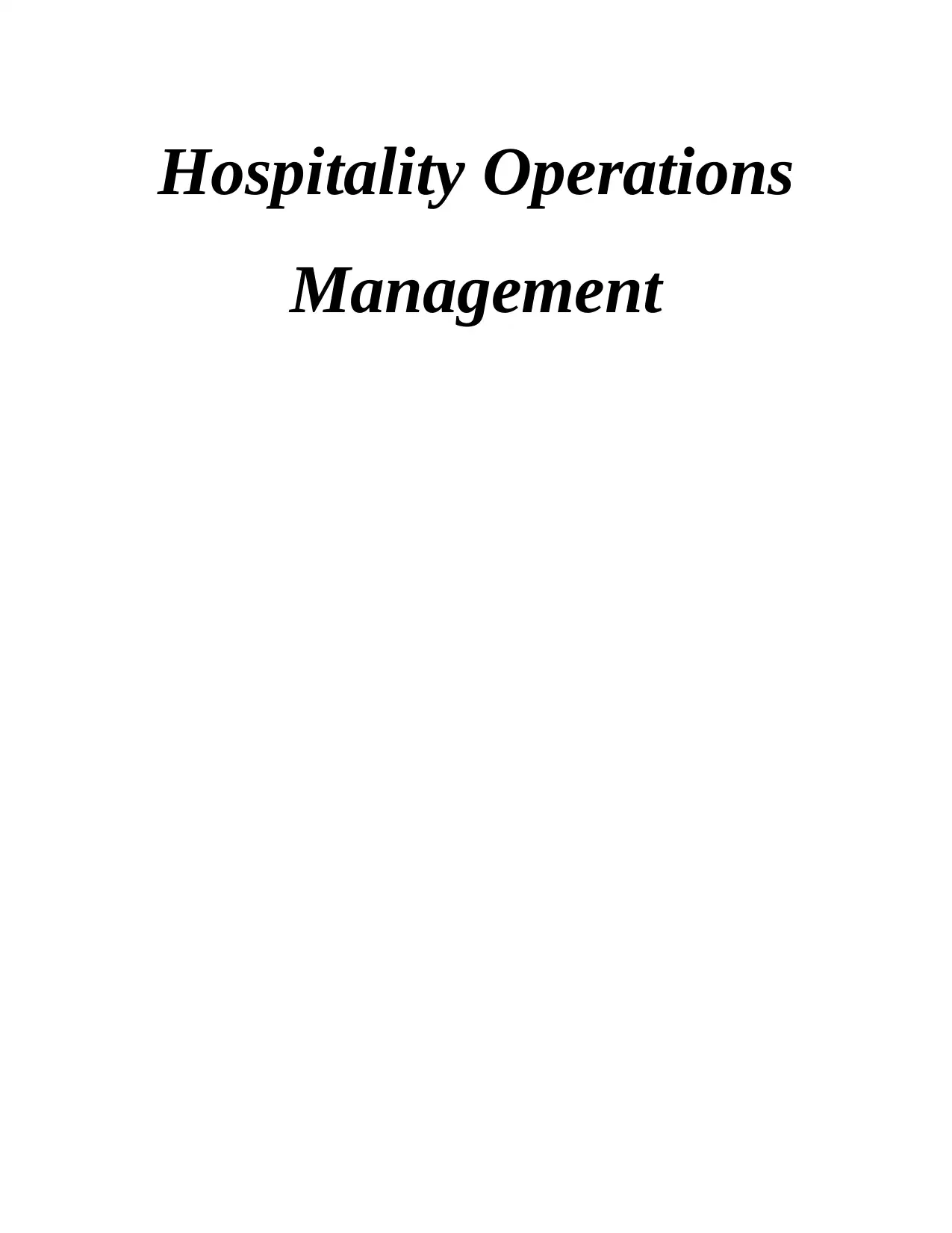
Hospitality Operations
Management
Management
Paraphrase This Document
Need a fresh take? Get an instant paraphrase of this document with our AI Paraphraser
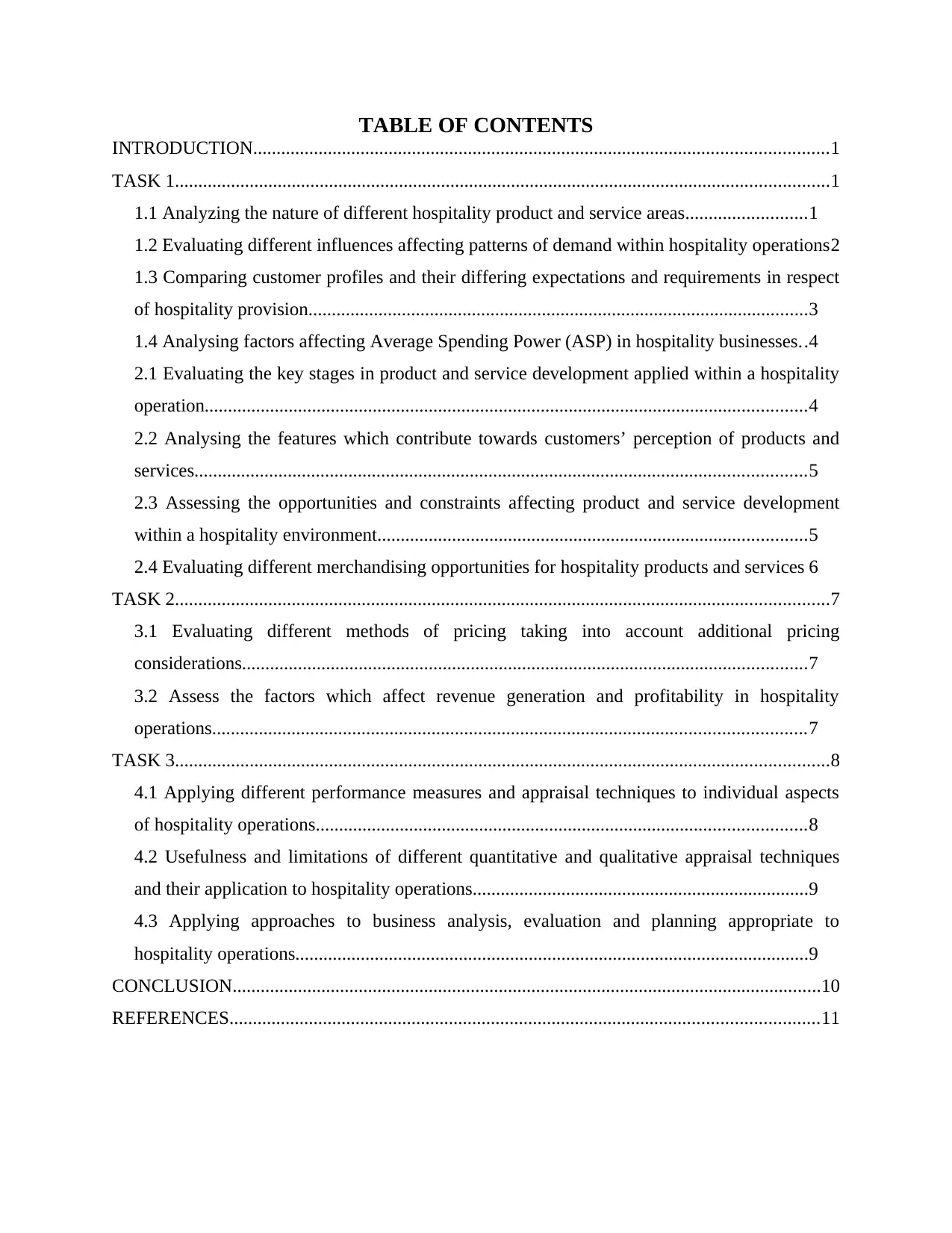
TABLE OF CONTENTS
INTRODUCTION...........................................................................................................................1
TASK 1............................................................................................................................................1
1.1 Analyzing the nature of different hospitality product and service areas..........................1
1.2 Evaluating different influences affecting patterns of demand within hospitality operations2
1.3 Comparing customer profiles and their differing expectations and requirements in respect
of hospitality provision...........................................................................................................3
1.4 Analysing factors affecting Average Spending Power (ASP) in hospitality businesses..4
2.1 Evaluating the key stages in product and service development applied within a hospitality
operation.................................................................................................................................4
2.2 Analysing the features which contribute towards customers’ perception of products and
services...................................................................................................................................5
2.3 Assessing the opportunities and constraints affecting product and service development
within a hospitality environment............................................................................................5
2.4 Evaluating different merchandising opportunities for hospitality products and services 6
TASK 2............................................................................................................................................7
3.1 Evaluating different methods of pricing taking into account additional pricing
considerations.........................................................................................................................7
3.2 Assess the factors which affect revenue generation and profitability in hospitality
operations...............................................................................................................................7
TASK 3............................................................................................................................................8
4.1 Applying different performance measures and appraisal techniques to individual aspects
of hospitality operations.........................................................................................................8
4.2 Usefulness and limitations of different quantitative and qualitative appraisal techniques
and their application to hospitality operations........................................................................9
4.3 Applying approaches to business analysis, evaluation and planning appropriate to
hospitality operations..............................................................................................................9
CONCLUSION..............................................................................................................................10
REFERENCES..............................................................................................................................11
INTRODUCTION...........................................................................................................................1
TASK 1............................................................................................................................................1
1.1 Analyzing the nature of different hospitality product and service areas..........................1
1.2 Evaluating different influences affecting patterns of demand within hospitality operations2
1.3 Comparing customer profiles and their differing expectations and requirements in respect
of hospitality provision...........................................................................................................3
1.4 Analysing factors affecting Average Spending Power (ASP) in hospitality businesses..4
2.1 Evaluating the key stages in product and service development applied within a hospitality
operation.................................................................................................................................4
2.2 Analysing the features which contribute towards customers’ perception of products and
services...................................................................................................................................5
2.3 Assessing the opportunities and constraints affecting product and service development
within a hospitality environment............................................................................................5
2.4 Evaluating different merchandising opportunities for hospitality products and services 6
TASK 2............................................................................................................................................7
3.1 Evaluating different methods of pricing taking into account additional pricing
considerations.........................................................................................................................7
3.2 Assess the factors which affect revenue generation and profitability in hospitality
operations...............................................................................................................................7
TASK 3............................................................................................................................................8
4.1 Applying different performance measures and appraisal techniques to individual aspects
of hospitality operations.........................................................................................................8
4.2 Usefulness and limitations of different quantitative and qualitative appraisal techniques
and their application to hospitality operations........................................................................9
4.3 Applying approaches to business analysis, evaluation and planning appropriate to
hospitality operations..............................................................................................................9
CONCLUSION..............................................................................................................................10
REFERENCES..............................................................................................................................11
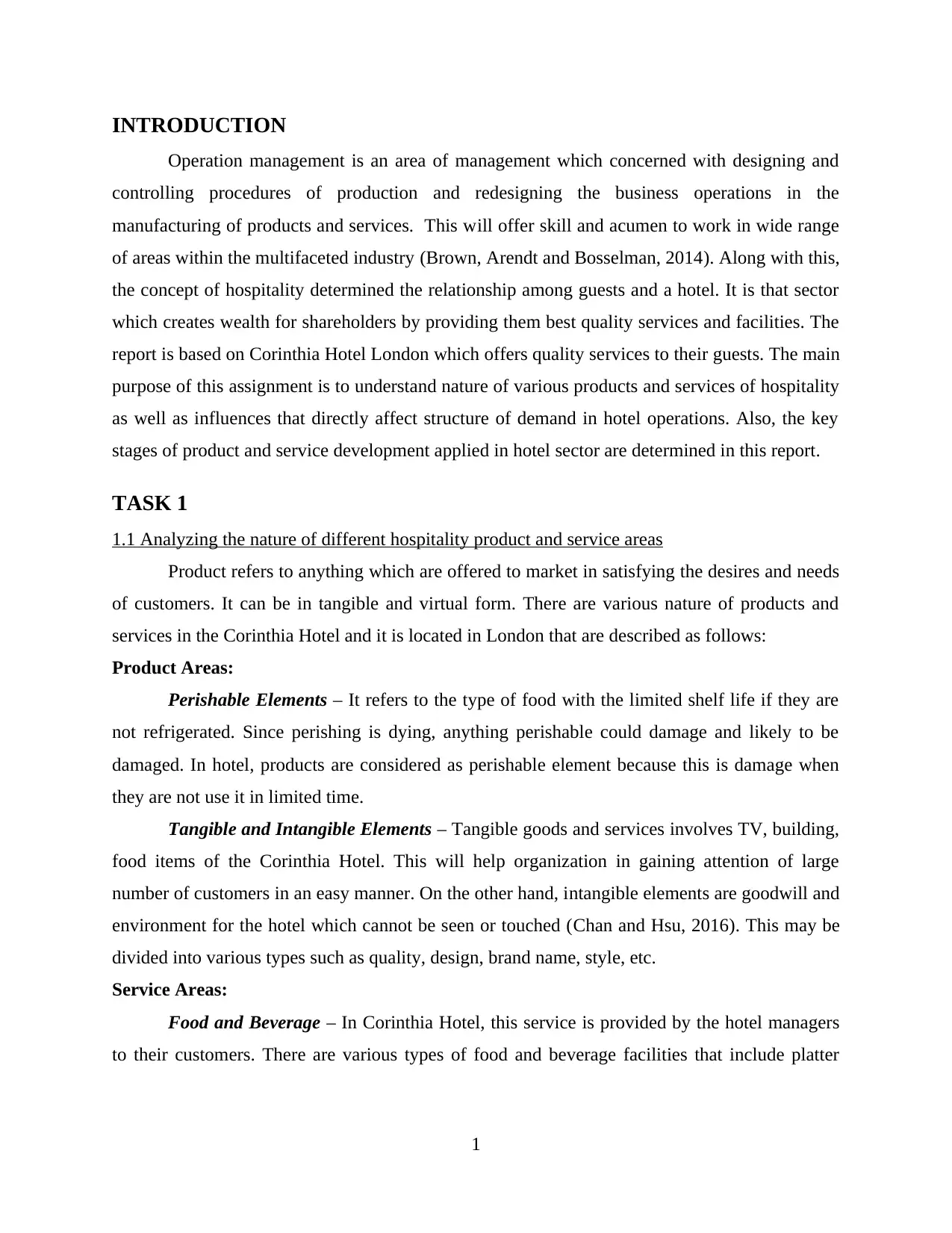
INTRODUCTION
Operation management is an area of management which concerned with designing and
controlling procedures of production and redesigning the business operations in the
manufacturing of products and services. This will offer skill and acumen to work in wide range
of areas within the multifaceted industry (Brown, Arendt and Bosselman, 2014). Along with this,
the concept of hospitality determined the relationship among guests and a hotel. It is that sector
which creates wealth for shareholders by providing them best quality services and facilities. The
report is based on Corinthia Hotel London which offers quality services to their guests. The main
purpose of this assignment is to understand nature of various products and services of hospitality
as well as influences that directly affect structure of demand in hotel operations. Also, the key
stages of product and service development applied in hotel sector are determined in this report.
TASK 1
1.1 Analyzing the nature of different hospitality product and service areas
Product refers to anything which are offered to market in satisfying the desires and needs
of customers. It can be in tangible and virtual form. There are various nature of products and
services in the Corinthia Hotel and it is located in London that are described as follows:
Product Areas:
Perishable Elements – It refers to the type of food with the limited shelf life if they are
not refrigerated. Since perishing is dying, anything perishable could damage and likely to be
damaged. In hotel, products are considered as perishable element because this is damage when
they are not use it in limited time.
Tangible and Intangible Elements – Tangible goods and services involves TV, building,
food items of the Corinthia Hotel. This will help organization in gaining attention of large
number of customers in an easy manner. On the other hand, intangible elements are goodwill and
environment for the hotel which cannot be seen or touched (Chan and Hsu, 2016). This may be
divided into various types such as quality, design, brand name, style, etc.
Service Areas:
Food and Beverage – In Corinthia Hotel, this service is provided by the hotel managers
to their customers. There are various types of food and beverage facilities that include platter
1
Operation management is an area of management which concerned with designing and
controlling procedures of production and redesigning the business operations in the
manufacturing of products and services. This will offer skill and acumen to work in wide range
of areas within the multifaceted industry (Brown, Arendt and Bosselman, 2014). Along with this,
the concept of hospitality determined the relationship among guests and a hotel. It is that sector
which creates wealth for shareholders by providing them best quality services and facilities. The
report is based on Corinthia Hotel London which offers quality services to their guests. The main
purpose of this assignment is to understand nature of various products and services of hospitality
as well as influences that directly affect structure of demand in hotel operations. Also, the key
stages of product and service development applied in hotel sector are determined in this report.
TASK 1
1.1 Analyzing the nature of different hospitality product and service areas
Product refers to anything which are offered to market in satisfying the desires and needs
of customers. It can be in tangible and virtual form. There are various nature of products and
services in the Corinthia Hotel and it is located in London that are described as follows:
Product Areas:
Perishable Elements – It refers to the type of food with the limited shelf life if they are
not refrigerated. Since perishing is dying, anything perishable could damage and likely to be
damaged. In hotel, products are considered as perishable element because this is damage when
they are not use it in limited time.
Tangible and Intangible Elements – Tangible goods and services involves TV, building,
food items of the Corinthia Hotel. This will help organization in gaining attention of large
number of customers in an easy manner. On the other hand, intangible elements are goodwill and
environment for the hotel which cannot be seen or touched (Chan and Hsu, 2016). This may be
divided into various types such as quality, design, brand name, style, etc.
Service Areas:
Food and Beverage – In Corinthia Hotel, this service is provided by the hotel managers
to their customers. There are various types of food and beverage facilities that include platter
1
⊘ This is a preview!⊘
Do you want full access?
Subscribe today to unlock all pages.

Trusted by 1+ million students worldwide
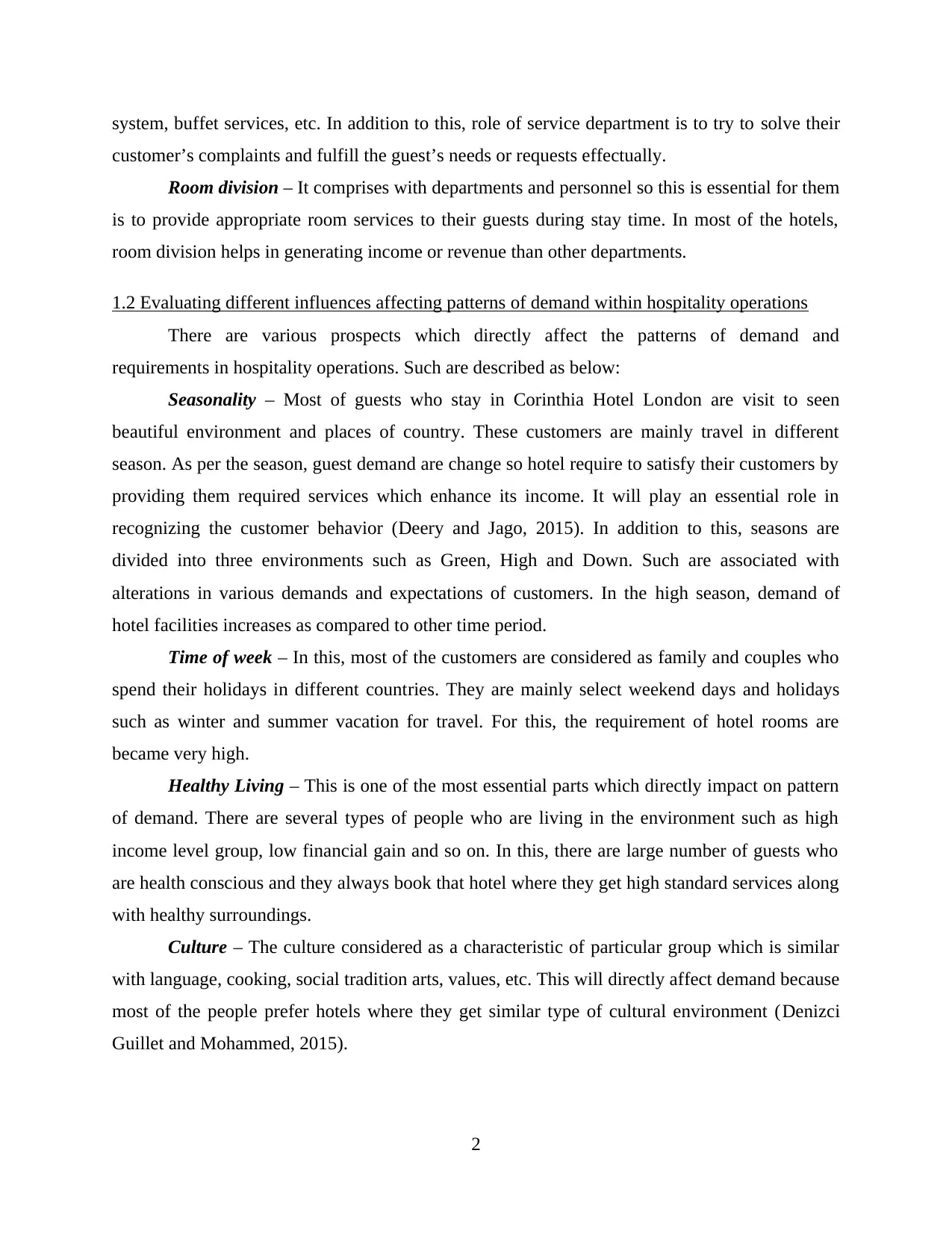
system, buffet services, etc. In addition to this, role of service department is to try to solve their
customer’s complaints and fulfill the guest’s needs or requests effectually.
Room division – It comprises with departments and personnel so this is essential for them
is to provide appropriate room services to their guests during stay time. In most of the hotels,
room division helps in generating income or revenue than other departments.
1.2 Evaluating different influences affecting patterns of demand within hospitality operations
There are various prospects which directly affect the patterns of demand and
requirements in hospitality operations. Such are described as below:
Seasonality – Most of guests who stay in Corinthia Hotel London are visit to seen
beautiful environment and places of country. These customers are mainly travel in different
season. As per the season, guest demand are change so hotel require to satisfy their customers by
providing them required services which enhance its income. It will play an essential role in
recognizing the customer behavior (Deery and Jago, 2015). In addition to this, seasons are
divided into three environments such as Green, High and Down. Such are associated with
alterations in various demands and expectations of customers. In the high season, demand of
hotel facilities increases as compared to other time period.
Time of week – In this, most of the customers are considered as family and couples who
spend their holidays in different countries. They are mainly select weekend days and holidays
such as winter and summer vacation for travel. For this, the requirement of hotel rooms are
became very high.
Healthy Living – This is one of the most essential parts which directly impact on pattern
of demand. There are several types of people who are living in the environment such as high
income level group, low financial gain and so on. In this, there are large number of guests who
are health conscious and they always book that hotel where they get high standard services along
with healthy surroundings.
Culture – The culture considered as a characteristic of particular group which is similar
with language, cooking, social tradition arts, values, etc. This will directly affect demand because
most of the people prefer hotels where they get similar type of cultural environment (Denizci
Guillet and Mohammed, 2015).
2
customer’s complaints and fulfill the guest’s needs or requests effectually.
Room division – It comprises with departments and personnel so this is essential for them
is to provide appropriate room services to their guests during stay time. In most of the hotels,
room division helps in generating income or revenue than other departments.
1.2 Evaluating different influences affecting patterns of demand within hospitality operations
There are various prospects which directly affect the patterns of demand and
requirements in hospitality operations. Such are described as below:
Seasonality – Most of guests who stay in Corinthia Hotel London are visit to seen
beautiful environment and places of country. These customers are mainly travel in different
season. As per the season, guest demand are change so hotel require to satisfy their customers by
providing them required services which enhance its income. It will play an essential role in
recognizing the customer behavior (Deery and Jago, 2015). In addition to this, seasons are
divided into three environments such as Green, High and Down. Such are associated with
alterations in various demands and expectations of customers. In the high season, demand of
hotel facilities increases as compared to other time period.
Time of week – In this, most of the customers are considered as family and couples who
spend their holidays in different countries. They are mainly select weekend days and holidays
such as winter and summer vacation for travel. For this, the requirement of hotel rooms are
became very high.
Healthy Living – This is one of the most essential parts which directly impact on pattern
of demand. There are several types of people who are living in the environment such as high
income level group, low financial gain and so on. In this, there are large number of guests who
are health conscious and they always book that hotel where they get high standard services along
with healthy surroundings.
Culture – The culture considered as a characteristic of particular group which is similar
with language, cooking, social tradition arts, values, etc. This will directly affect demand because
most of the people prefer hotels where they get similar type of cultural environment (Denizci
Guillet and Mohammed, 2015).
2
Paraphrase This Document
Need a fresh take? Get an instant paraphrase of this document with our AI Paraphraser
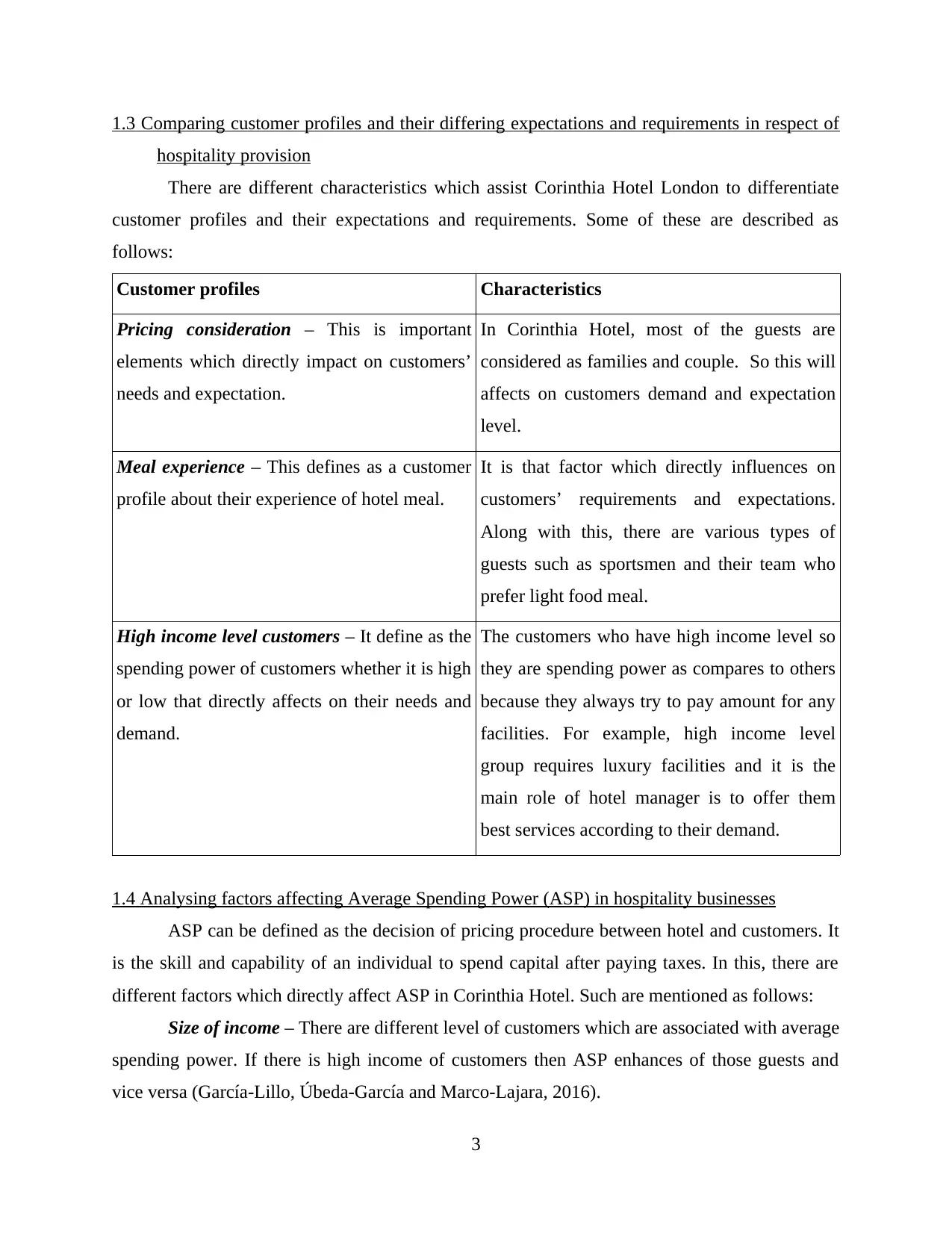
1.3 Comparing customer profiles and their differing expectations and requirements in respect of
hospitality provision
There are different characteristics which assist Corinthia Hotel London to differentiate
customer profiles and their expectations and requirements. Some of these are described as
follows:
Customer profiles Characteristics
Pricing consideration – This is important
elements which directly impact on customers’
needs and expectation.
In Corinthia Hotel, most of the guests are
considered as families and couple. So this will
affects on customers demand and expectation
level.
Meal experience – This defines as a customer
profile about their experience of hotel meal.
It is that factor which directly influences on
customers’ requirements and expectations.
Along with this, there are various types of
guests such as sportsmen and their team who
prefer light food meal.
High income level customers – It define as the
spending power of customers whether it is high
or low that directly affects on their needs and
demand.
The customers who have high income level so
they are spending power as compares to others
because they always try to pay amount for any
facilities. For example, high income level
group requires luxury facilities and it is the
main role of hotel manager is to offer them
best services according to their demand.
1.4 Analysing factors affecting Average Spending Power (ASP) in hospitality businesses
ASP can be defined as the decision of pricing procedure between hotel and customers. It
is the skill and capability of an individual to spend capital after paying taxes. In this, there are
different factors which directly affect ASP in Corinthia Hotel. Such are mentioned as follows:
Size of income – There are different level of customers which are associated with average
spending power. If there is high income of customers then ASP enhances of those guests and
vice versa (García-Lillo, Úbeda-García and Marco-Lajara, 2016).
3
hospitality provision
There are different characteristics which assist Corinthia Hotel London to differentiate
customer profiles and their expectations and requirements. Some of these are described as
follows:
Customer profiles Characteristics
Pricing consideration – This is important
elements which directly impact on customers’
needs and expectation.
In Corinthia Hotel, most of the guests are
considered as families and couple. So this will
affects on customers demand and expectation
level.
Meal experience – This defines as a customer
profile about their experience of hotel meal.
It is that factor which directly influences on
customers’ requirements and expectations.
Along with this, there are various types of
guests such as sportsmen and their team who
prefer light food meal.
High income level customers – It define as the
spending power of customers whether it is high
or low that directly affects on their needs and
demand.
The customers who have high income level so
they are spending power as compares to others
because they always try to pay amount for any
facilities. For example, high income level
group requires luxury facilities and it is the
main role of hotel manager is to offer them
best services according to their demand.
1.4 Analysing factors affecting Average Spending Power (ASP) in hospitality businesses
ASP can be defined as the decision of pricing procedure between hotel and customers. It
is the skill and capability of an individual to spend capital after paying taxes. In this, there are
different factors which directly affect ASP in Corinthia Hotel. Such are mentioned as follows:
Size of income – There are different level of customers which are associated with average
spending power. If there is high income of customers then ASP enhances of those guests and
vice versa (García-Lillo, Úbeda-García and Marco-Lajara, 2016).
3
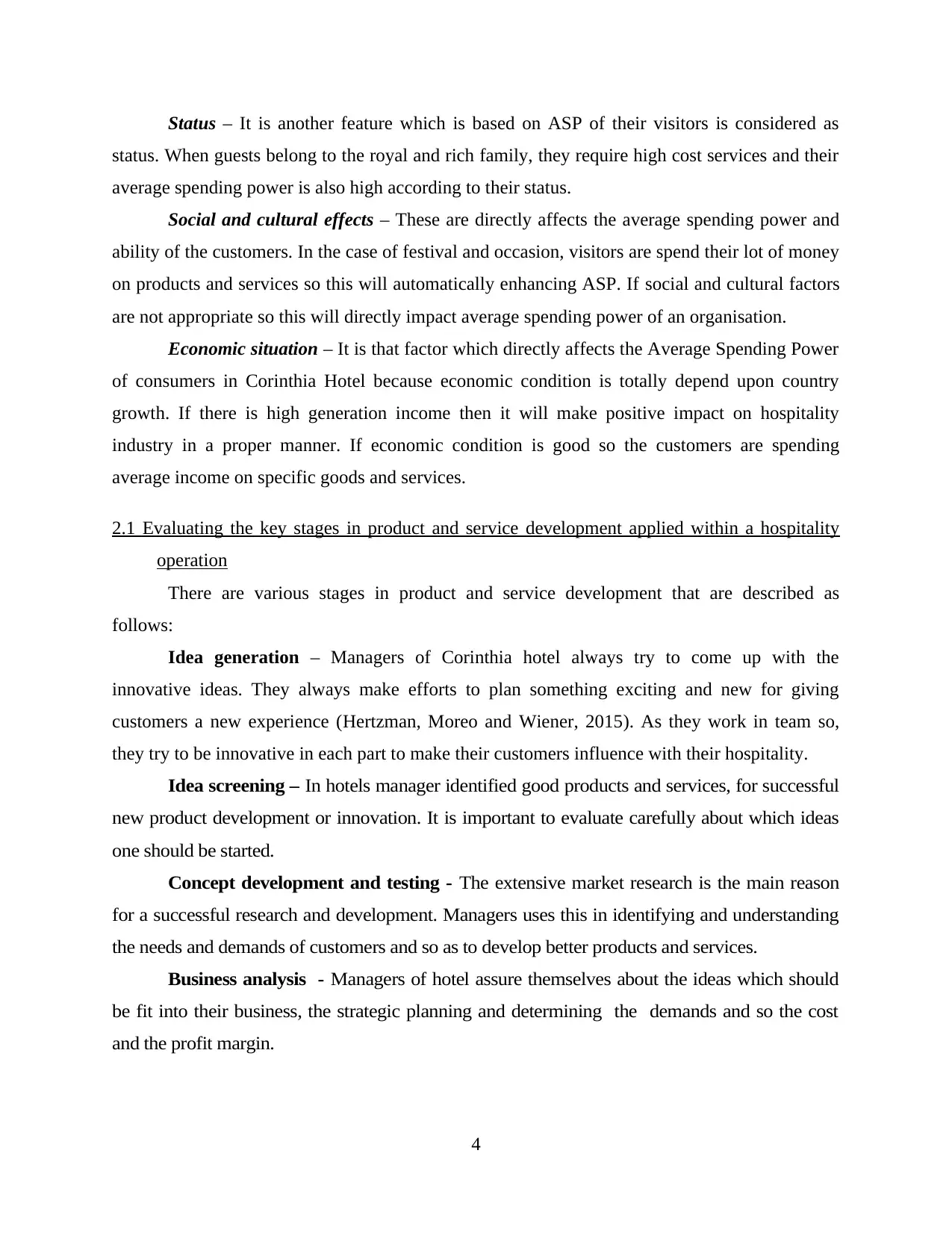
Status – It is another feature which is based on ASP of their visitors is considered as
status. When guests belong to the royal and rich family, they require high cost services and their
average spending power is also high according to their status.
Social and cultural effects – These are directly affects the average spending power and
ability of the customers. In the case of festival and occasion, visitors are spend their lot of money
on products and services so this will automatically enhancing ASP. If social and cultural factors
are not appropriate so this will directly impact average spending power of an organisation.
Economic situation – It is that factor which directly affects the Average Spending Power
of consumers in Corinthia Hotel because economic condition is totally depend upon country
growth. If there is high generation income then it will make positive impact on hospitality
industry in a proper manner. If economic condition is good so the customers are spending
average income on specific goods and services.
2.1 Evaluating the key stages in product and service development applied within a hospitality
operation
There are various stages in product and service development that are described as
follows:
Idea generation – Managers of Corinthia hotel always try to come up with the
innovative ideas. They always make efforts to plan something exciting and new for giving
customers a new experience (Hertzman, Moreo and Wiener, 2015). As they work in team so,
they try to be innovative in each part to make their customers influence with their hospitality.
Idea screening – In hotels manager identified good products and services, for successful
new product development or innovation. It is important to evaluate carefully about which ideas
one should be started.
Concept development and testing - The extensive market research is the main reason
for a successful research and development. Managers uses this in identifying and understanding
the needs and demands of customers and so as to develop better products and services.
Business analysis - Managers of hotel assure themselves about the ideas which should
be fit into their business, the strategic planning and determining the demands and so the cost
and the profit margin.
4
status. When guests belong to the royal and rich family, they require high cost services and their
average spending power is also high according to their status.
Social and cultural effects – These are directly affects the average spending power and
ability of the customers. In the case of festival and occasion, visitors are spend their lot of money
on products and services so this will automatically enhancing ASP. If social and cultural factors
are not appropriate so this will directly impact average spending power of an organisation.
Economic situation – It is that factor which directly affects the Average Spending Power
of consumers in Corinthia Hotel because economic condition is totally depend upon country
growth. If there is high generation income then it will make positive impact on hospitality
industry in a proper manner. If economic condition is good so the customers are spending
average income on specific goods and services.
2.1 Evaluating the key stages in product and service development applied within a hospitality
operation
There are various stages in product and service development that are described as
follows:
Idea generation – Managers of Corinthia hotel always try to come up with the
innovative ideas. They always make efforts to plan something exciting and new for giving
customers a new experience (Hertzman, Moreo and Wiener, 2015). As they work in team so,
they try to be innovative in each part to make their customers influence with their hospitality.
Idea screening – In hotels manager identified good products and services, for successful
new product development or innovation. It is important to evaluate carefully about which ideas
one should be started.
Concept development and testing - The extensive market research is the main reason
for a successful research and development. Managers uses this in identifying and understanding
the needs and demands of customers and so as to develop better products and services.
Business analysis - Managers of hotel assure themselves about the ideas which should
be fit into their business, the strategic planning and determining the demands and so the cost
and the profit margin.
4
⊘ This is a preview!⊘
Do you want full access?
Subscribe today to unlock all pages.

Trusted by 1+ million students worldwide
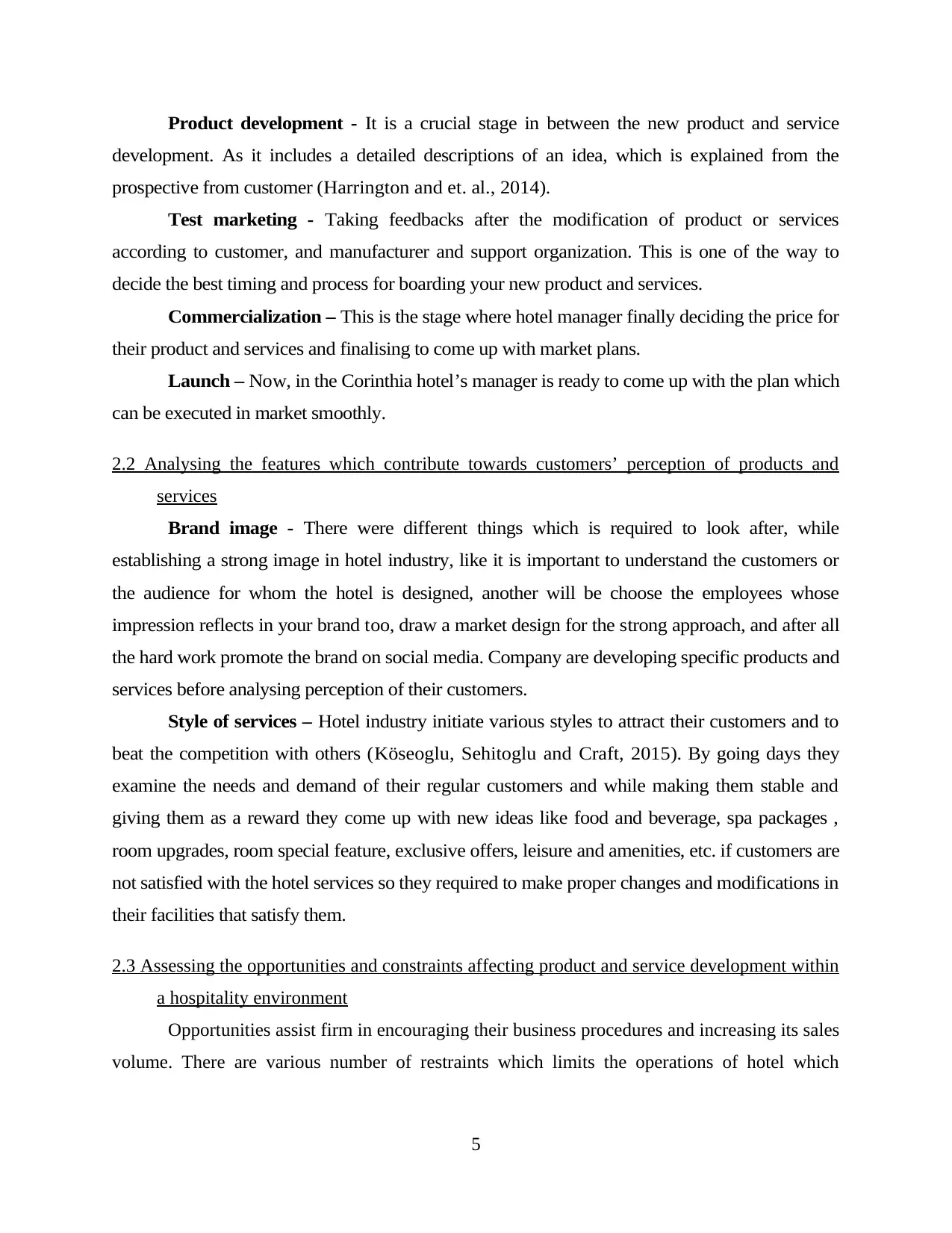
Product development - It is a crucial stage in between the new product and service
development. As it includes a detailed descriptions of an idea, which is explained from the
prospective from customer (Harrington and et. al., 2014).
Test marketing - Taking feedbacks after the modification of product or services
according to customer, and manufacturer and support organization. This is one of the way to
decide the best timing and process for boarding your new product and services.
Commercialization – This is the stage where hotel manager finally deciding the price for
their product and services and finalising to come up with market plans.
Launch – Now, in the Corinthia hotel’s manager is ready to come up with the plan which
can be executed in market smoothly.
2.2 Analysing the features which contribute towards customers’ perception of products and
services
Brand image - There were different things which is required to look after, while
establishing a strong image in hotel industry, like it is important to understand the customers or
the audience for whom the hotel is designed, another will be choose the employees whose
impression reflects in your brand too, draw a market design for the strong approach, and after all
the hard work promote the brand on social media. Company are developing specific products and
services before analysing perception of their customers.
Style of services – Hotel industry initiate various styles to attract their customers and to
beat the competition with others (Köseoglu, Sehitoglu and Craft, 2015). By going days they
examine the needs and demand of their regular customers and while making them stable and
giving them as a reward they come up with new ideas like food and beverage, spa packages ,
room upgrades, room special feature, exclusive offers, leisure and amenities, etc. if customers are
not satisfied with the hotel services so they required to make proper changes and modifications in
their facilities that satisfy them.
2.3 Assessing the opportunities and constraints affecting product and service development within
a hospitality environment
Opportunities assist firm in encouraging their business procedures and increasing its sales
volume. There are various number of restraints which limits the operations of hotel which
5
development. As it includes a detailed descriptions of an idea, which is explained from the
prospective from customer (Harrington and et. al., 2014).
Test marketing - Taking feedbacks after the modification of product or services
according to customer, and manufacturer and support organization. This is one of the way to
decide the best timing and process for boarding your new product and services.
Commercialization – This is the stage where hotel manager finally deciding the price for
their product and services and finalising to come up with market plans.
Launch – Now, in the Corinthia hotel’s manager is ready to come up with the plan which
can be executed in market smoothly.
2.2 Analysing the features which contribute towards customers’ perception of products and
services
Brand image - There were different things which is required to look after, while
establishing a strong image in hotel industry, like it is important to understand the customers or
the audience for whom the hotel is designed, another will be choose the employees whose
impression reflects in your brand too, draw a market design for the strong approach, and after all
the hard work promote the brand on social media. Company are developing specific products and
services before analysing perception of their customers.
Style of services – Hotel industry initiate various styles to attract their customers and to
beat the competition with others (Köseoglu, Sehitoglu and Craft, 2015). By going days they
examine the needs and demand of their regular customers and while making them stable and
giving them as a reward they come up with new ideas like food and beverage, spa packages ,
room upgrades, room special feature, exclusive offers, leisure and amenities, etc. if customers are
not satisfied with the hotel services so they required to make proper changes and modifications in
their facilities that satisfy them.
2.3 Assessing the opportunities and constraints affecting product and service development within
a hospitality environment
Opportunities assist firm in encouraging their business procedures and increasing its sales
volume. There are various number of restraints which limits the operations of hotel which
5
Paraphrase This Document
Need a fresh take? Get an instant paraphrase of this document with our AI Paraphraser
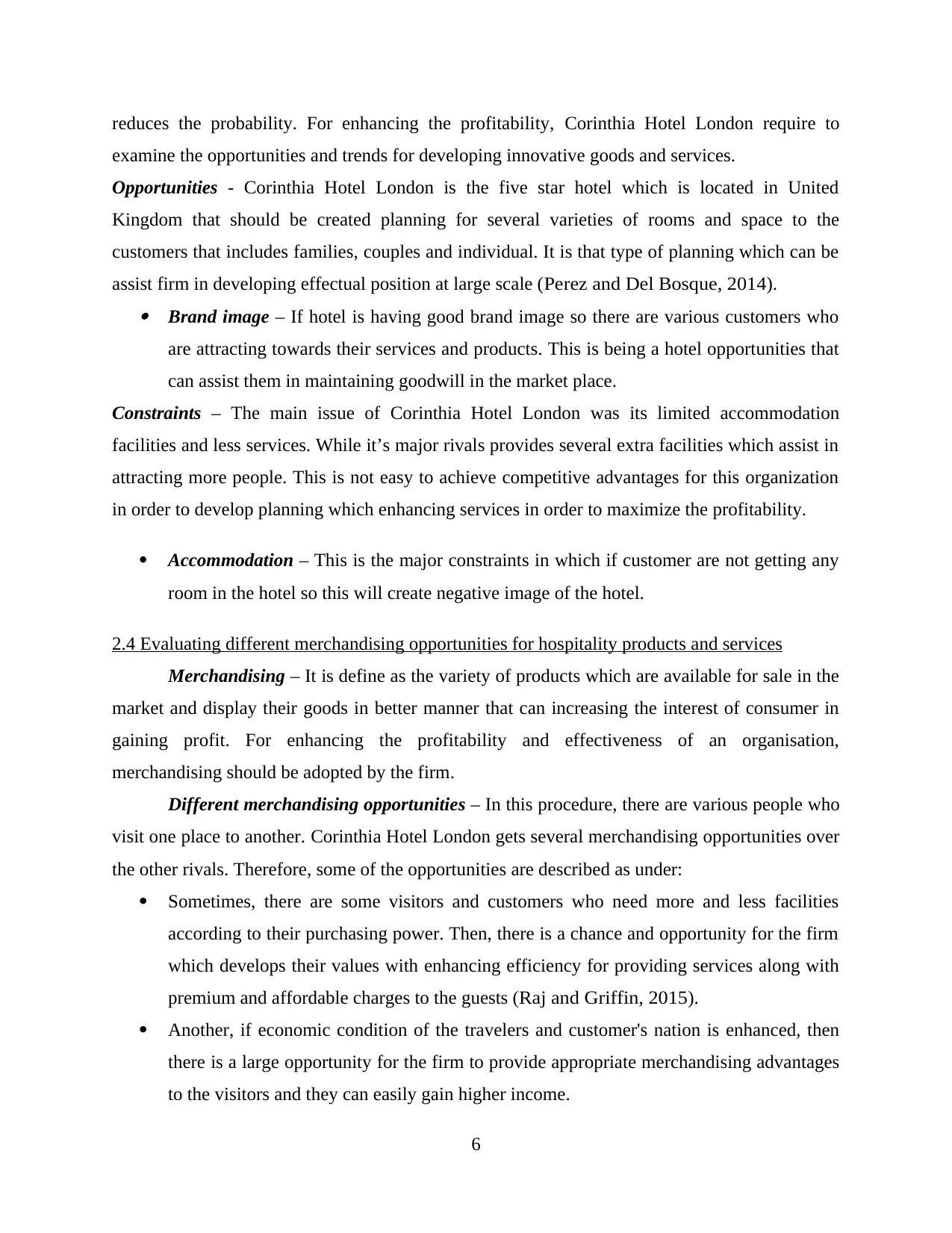
reduces the probability. For enhancing the profitability, Corinthia Hotel London require to
examine the opportunities and trends for developing innovative goods and services.
Opportunities - Corinthia Hotel London is the five star hotel which is located in United
Kingdom that should be created planning for several varieties of rooms and space to the
customers that includes families, couples and individual. It is that type of planning which can be
assist firm in developing effectual position at large scale ( Perez and Del Bosque, 2014). Brand image – If hotel is having good brand image so there are various customers who
are attracting towards their services and products. This is being a hotel opportunities that
can assist them in maintaining goodwill in the market place.
Constraints – The main issue of Corinthia Hotel London was its limited accommodation
facilities and less services. While it’s major rivals provides several extra facilities which assist in
attracting more people. This is not easy to achieve competitive advantages for this organization
in order to develop planning which enhancing services in order to maximize the profitability.
Accommodation – This is the major constraints in which if customer are not getting any
room in the hotel so this will create negative image of the hotel.
2.4 Evaluating different merchandising opportunities for hospitality products and services
Merchandising – It is define as the variety of products which are available for sale in the
market and display their goods in better manner that can increasing the interest of consumer in
gaining profit. For enhancing the profitability and effectiveness of an organisation,
merchandising should be adopted by the firm.
Different merchandising opportunities – In this procedure, there are various people who
visit one place to another. Corinthia Hotel London gets several merchandising opportunities over
the other rivals. Therefore, some of the opportunities are described as under:
Sometimes, there are some visitors and customers who need more and less facilities
according to their purchasing power. Then, there is a chance and opportunity for the firm
which develops their values with enhancing efficiency for providing services along with
premium and affordable charges to the guests ( Raj and Griffin, 2015).
Another, if economic condition of the travelers and customer's nation is enhanced, then
there is a large opportunity for the firm to provide appropriate merchandising advantages
to the visitors and they can easily gain higher income.
6
examine the opportunities and trends for developing innovative goods and services.
Opportunities - Corinthia Hotel London is the five star hotel which is located in United
Kingdom that should be created planning for several varieties of rooms and space to the
customers that includes families, couples and individual. It is that type of planning which can be
assist firm in developing effectual position at large scale ( Perez and Del Bosque, 2014). Brand image – If hotel is having good brand image so there are various customers who
are attracting towards their services and products. This is being a hotel opportunities that
can assist them in maintaining goodwill in the market place.
Constraints – The main issue of Corinthia Hotel London was its limited accommodation
facilities and less services. While it’s major rivals provides several extra facilities which assist in
attracting more people. This is not easy to achieve competitive advantages for this organization
in order to develop planning which enhancing services in order to maximize the profitability.
Accommodation – This is the major constraints in which if customer are not getting any
room in the hotel so this will create negative image of the hotel.
2.4 Evaluating different merchandising opportunities for hospitality products and services
Merchandising – It is define as the variety of products which are available for sale in the
market and display their goods in better manner that can increasing the interest of consumer in
gaining profit. For enhancing the profitability and effectiveness of an organisation,
merchandising should be adopted by the firm.
Different merchandising opportunities – In this procedure, there are various people who
visit one place to another. Corinthia Hotel London gets several merchandising opportunities over
the other rivals. Therefore, some of the opportunities are described as under:
Sometimes, there are some visitors and customers who need more and less facilities
according to their purchasing power. Then, there is a chance and opportunity for the firm
which develops their values with enhancing efficiency for providing services along with
premium and affordable charges to the guests ( Raj and Griffin, 2015).
Another, if economic condition of the travelers and customer's nation is enhanced, then
there is a large opportunity for the firm to provide appropriate merchandising advantages
to the visitors and they can easily gain higher income.
6
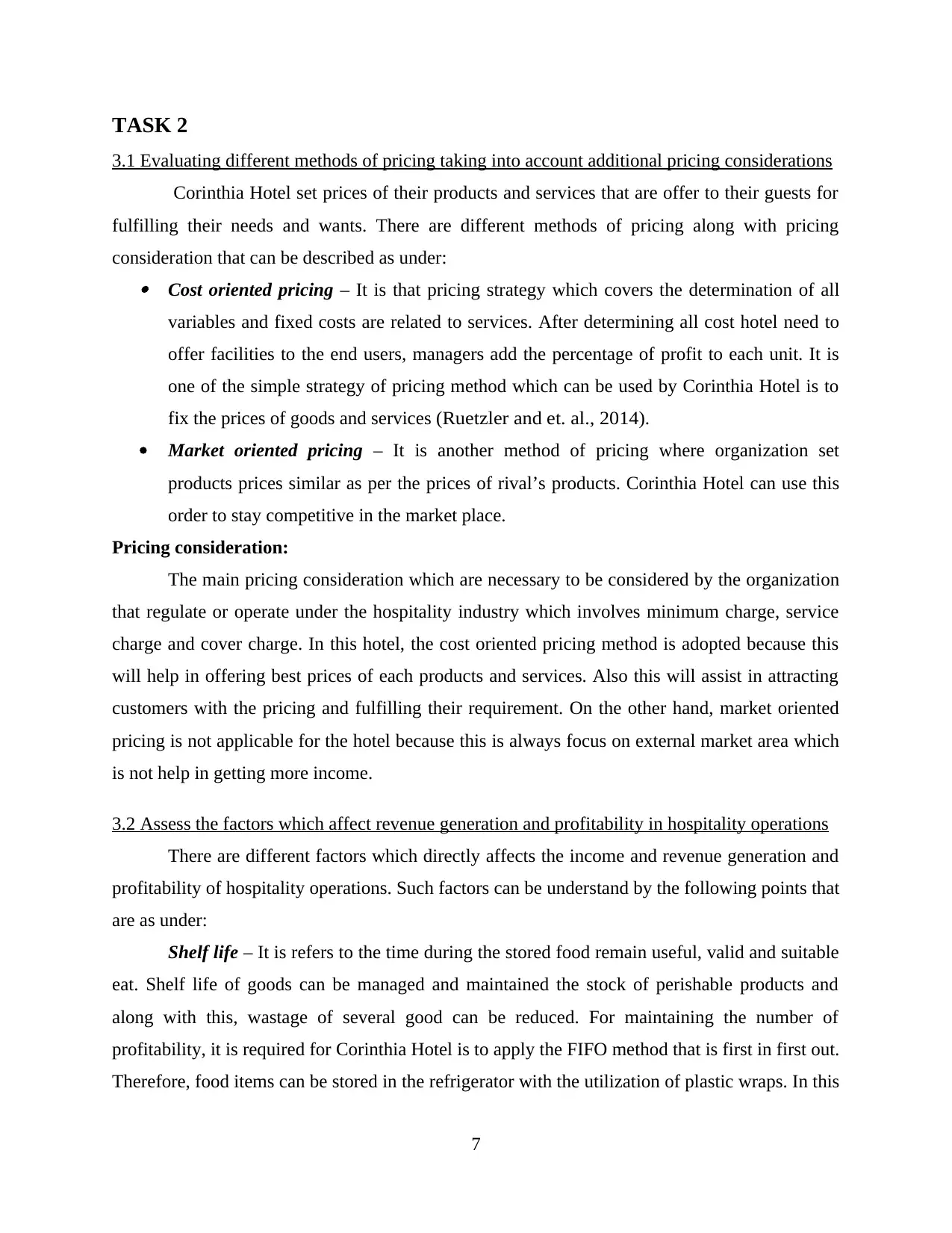
TASK 2
3.1 Evaluating different methods of pricing taking into account additional pricing considerations
Corinthia Hotel set prices of their products and services that are offer to their guests for
fulfilling their needs and wants. There are different methods of pricing along with pricing
consideration that can be described as under: Cost oriented pricing – It is that pricing strategy which covers the determination of all
variables and fixed costs are related to services. After determining all cost hotel need to
offer facilities to the end users, managers add the percentage of profit to each unit. It is
one of the simple strategy of pricing method which can be used by Corinthia Hotel is to
fix the prices of goods and services ( Ruetzler and et. al., 2014).
Market oriented pricing – It is another method of pricing where organization set
products prices similar as per the prices of rival’s products. Corinthia Hotel can use this
order to stay competitive in the market place.
Pricing consideration:
The main pricing consideration which are necessary to be considered by the organization
that regulate or operate under the hospitality industry which involves minimum charge, service
charge and cover charge. In this hotel, the cost oriented pricing method is adopted because this
will help in offering best prices of each products and services. Also this will assist in attracting
customers with the pricing and fulfilling their requirement. On the other hand, market oriented
pricing is not applicable for the hotel because this is always focus on external market area which
is not help in getting more income.
3.2 Assess the factors which affect revenue generation and profitability in hospitality operations
There are different factors which directly affects the income and revenue generation and
profitability of hospitality operations. Such factors can be understand by the following points that
are as under:
Shelf life – It is refers to the time during the stored food remain useful, valid and suitable
eat. Shelf life of goods can be managed and maintained the stock of perishable products and
along with this, wastage of several good can be reduced. For maintaining the number of
profitability, it is required for Corinthia Hotel is to apply the FIFO method that is first in first out.
Therefore, food items can be stored in the refrigerator with the utilization of plastic wraps. In this
7
3.1 Evaluating different methods of pricing taking into account additional pricing considerations
Corinthia Hotel set prices of their products and services that are offer to their guests for
fulfilling their needs and wants. There are different methods of pricing along with pricing
consideration that can be described as under: Cost oriented pricing – It is that pricing strategy which covers the determination of all
variables and fixed costs are related to services. After determining all cost hotel need to
offer facilities to the end users, managers add the percentage of profit to each unit. It is
one of the simple strategy of pricing method which can be used by Corinthia Hotel is to
fix the prices of goods and services ( Ruetzler and et. al., 2014).
Market oriented pricing – It is another method of pricing where organization set
products prices similar as per the prices of rival’s products. Corinthia Hotel can use this
order to stay competitive in the market place.
Pricing consideration:
The main pricing consideration which are necessary to be considered by the organization
that regulate or operate under the hospitality industry which involves minimum charge, service
charge and cover charge. In this hotel, the cost oriented pricing method is adopted because this
will help in offering best prices of each products and services. Also this will assist in attracting
customers with the pricing and fulfilling their requirement. On the other hand, market oriented
pricing is not applicable for the hotel because this is always focus on external market area which
is not help in getting more income.
3.2 Assess the factors which affect revenue generation and profitability in hospitality operations
There are different factors which directly affects the income and revenue generation and
profitability of hospitality operations. Such factors can be understand by the following points that
are as under:
Shelf life – It is refers to the time during the stored food remain useful, valid and suitable
eat. Shelf life of goods can be managed and maintained the stock of perishable products and
along with this, wastage of several good can be reduced. For maintaining the number of
profitability, it is required for Corinthia Hotel is to apply the FIFO method that is first in first out.
Therefore, food items can be stored in the refrigerator with the utilization of plastic wraps. In this
7
⊘ This is a preview!⊘
Do you want full access?
Subscribe today to unlock all pages.

Trusted by 1+ million students worldwide
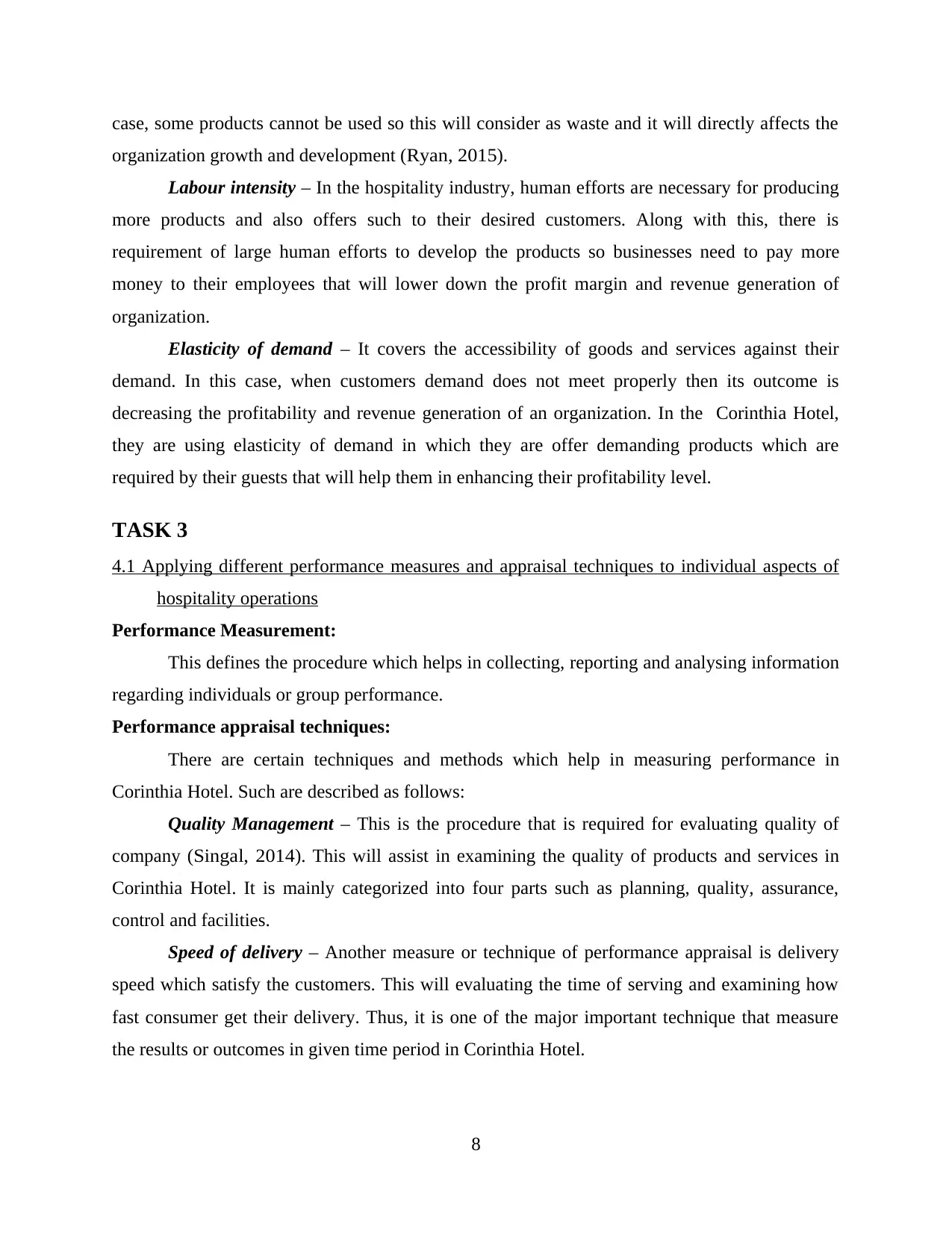
case, some products cannot be used so this will consider as waste and it will directly affects the
organization growth and development ( Ryan, 2015).
Labour intensity – In the hospitality industry, human efforts are necessary for producing
more products and also offers such to their desired customers. Along with this, there is
requirement of large human efforts to develop the products so businesses need to pay more
money to their employees that will lower down the profit margin and revenue generation of
organization.
Elasticity of demand – It covers the accessibility of goods and services against their
demand. In this case, when customers demand does not meet properly then its outcome is
decreasing the profitability and revenue generation of an organization. In the Corinthia Hotel,
they are using elasticity of demand in which they are offer demanding products which are
required by their guests that will help them in enhancing their profitability level.
TASK 3
4.1 Applying different performance measures and appraisal techniques to individual aspects of
hospitality operations
Performance Measurement:
This defines the procedure which helps in collecting, reporting and analysing information
regarding individuals or group performance.
Performance appraisal techniques:
There are certain techniques and methods which help in measuring performance in
Corinthia Hotel. Such are described as follows:
Quality Management – This is the procedure that is required for evaluating quality of
company ( Singal, 2014). This will assist in examining the quality of products and services in
Corinthia Hotel. It is mainly categorized into four parts such as planning, quality, assurance,
control and facilities.
Speed of delivery – Another measure or technique of performance appraisal is delivery
speed which satisfy the customers. This will evaluating the time of serving and examining how
fast consumer get their delivery. Thus, it is one of the major important technique that measure
the results or outcomes in given time period in Corinthia Hotel.
8
organization growth and development ( Ryan, 2015).
Labour intensity – In the hospitality industry, human efforts are necessary for producing
more products and also offers such to their desired customers. Along with this, there is
requirement of large human efforts to develop the products so businesses need to pay more
money to their employees that will lower down the profit margin and revenue generation of
organization.
Elasticity of demand – It covers the accessibility of goods and services against their
demand. In this case, when customers demand does not meet properly then its outcome is
decreasing the profitability and revenue generation of an organization. In the Corinthia Hotel,
they are using elasticity of demand in which they are offer demanding products which are
required by their guests that will help them in enhancing their profitability level.
TASK 3
4.1 Applying different performance measures and appraisal techniques to individual aspects of
hospitality operations
Performance Measurement:
This defines the procedure which helps in collecting, reporting and analysing information
regarding individuals or group performance.
Performance appraisal techniques:
There are certain techniques and methods which help in measuring performance in
Corinthia Hotel. Such are described as follows:
Quality Management – This is the procedure that is required for evaluating quality of
company ( Singal, 2014). This will assist in examining the quality of products and services in
Corinthia Hotel. It is mainly categorized into four parts such as planning, quality, assurance,
control and facilities.
Speed of delivery – Another measure or technique of performance appraisal is delivery
speed which satisfy the customers. This will evaluating the time of serving and examining how
fast consumer get their delivery. Thus, it is one of the major important technique that measure
the results or outcomes in given time period in Corinthia Hotel.
8
Paraphrase This Document
Need a fresh take? Get an instant paraphrase of this document with our AI Paraphraser
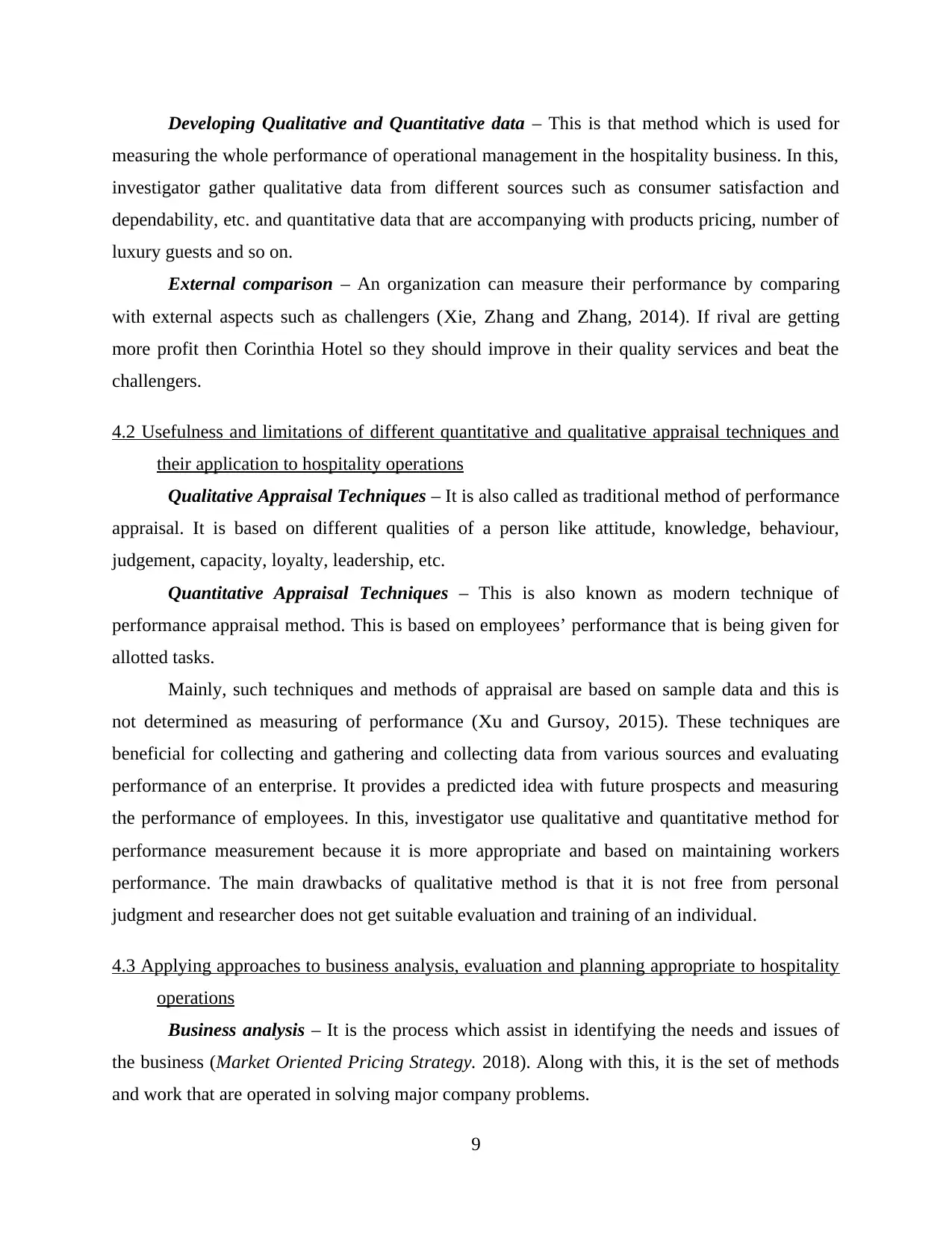
Developing Qualitative and Quantitative data – This is that method which is used for
measuring the whole performance of operational management in the hospitality business. In this,
investigator gather qualitative data from different sources such as consumer satisfaction and
dependability, etc. and quantitative data that are accompanying with products pricing, number of
luxury guests and so on.
External comparison – An organization can measure their performance by comparing
with external aspects such as challengers ( Xie, Zhang and Zhang, 2014). If rival are getting
more profit then Corinthia Hotel so they should improve in their quality services and beat the
challengers.
4.2 Usefulness and limitations of different quantitative and qualitative appraisal techniques and
their application to hospitality operations
Qualitative Appraisal Techniques – It is also called as traditional method of performance
appraisal. It is based on different qualities of a person like attitude, knowledge, behaviour,
judgement, capacity, loyalty, leadership, etc.
Quantitative Appraisal Techniques – This is also known as modern technique of
performance appraisal method. This is based on employees’ performance that is being given for
allotted tasks.
Mainly, such techniques and methods of appraisal are based on sample data and this is
not determined as measuring of performance ( Xu and Gursoy, 2015). These techniques are
beneficial for collecting and gathering and collecting data from various sources and evaluating
performance of an enterprise. It provides a predicted idea with future prospects and measuring
the performance of employees. In this, investigator use qualitative and quantitative method for
performance measurement because it is more appropriate and based on maintaining workers
performance. The main drawbacks of qualitative method is that it is not free from personal
judgment and researcher does not get suitable evaluation and training of an individual.
4.3 Applying approaches to business analysis, evaluation and planning appropriate to hospitality
operations
Business analysis – It is the process which assist in identifying the needs and issues of
the business (Market Oriented Pricing Strategy. 2018). Along with this, it is the set of methods
and work that are operated in solving major company problems.
9
measuring the whole performance of operational management in the hospitality business. In this,
investigator gather qualitative data from different sources such as consumer satisfaction and
dependability, etc. and quantitative data that are accompanying with products pricing, number of
luxury guests and so on.
External comparison – An organization can measure their performance by comparing
with external aspects such as challengers ( Xie, Zhang and Zhang, 2014). If rival are getting
more profit then Corinthia Hotel so they should improve in their quality services and beat the
challengers.
4.2 Usefulness and limitations of different quantitative and qualitative appraisal techniques and
their application to hospitality operations
Qualitative Appraisal Techniques – It is also called as traditional method of performance
appraisal. It is based on different qualities of a person like attitude, knowledge, behaviour,
judgement, capacity, loyalty, leadership, etc.
Quantitative Appraisal Techniques – This is also known as modern technique of
performance appraisal method. This is based on employees’ performance that is being given for
allotted tasks.
Mainly, such techniques and methods of appraisal are based on sample data and this is
not determined as measuring of performance ( Xu and Gursoy, 2015). These techniques are
beneficial for collecting and gathering and collecting data from various sources and evaluating
performance of an enterprise. It provides a predicted idea with future prospects and measuring
the performance of employees. In this, investigator use qualitative and quantitative method for
performance measurement because it is more appropriate and based on maintaining workers
performance. The main drawbacks of qualitative method is that it is not free from personal
judgment and researcher does not get suitable evaluation and training of an individual.
4.3 Applying approaches to business analysis, evaluation and planning appropriate to hospitality
operations
Business analysis – It is the process which assist in identifying the needs and issues of
the business (Market Oriented Pricing Strategy. 2018). Along with this, it is the set of methods
and work that are operated in solving major company problems.
9
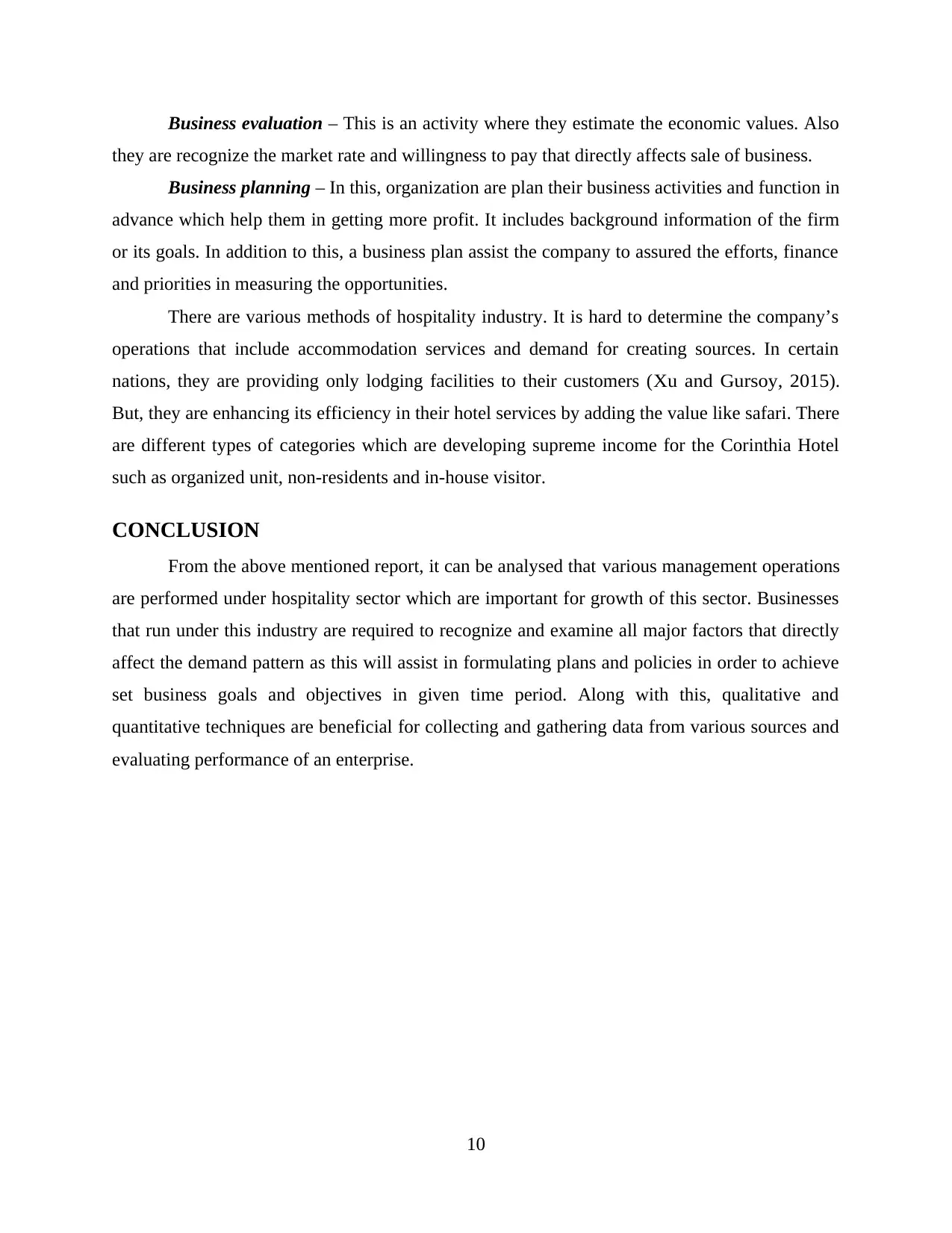
Business evaluation – This is an activity where they estimate the economic values. Also
they are recognize the market rate and willingness to pay that directly affects sale of business.
Business planning – In this, organization are plan their business activities and function in
advance which help them in getting more profit. It includes background information of the firm
or its goals. In addition to this, a business plan assist the company to assured the efforts, finance
and priorities in measuring the opportunities.
There are various methods of hospitality industry. It is hard to determine the company’s
operations that include accommodation services and demand for creating sources. In certain
nations, they are providing only lodging facilities to their customers ( Xu and Gursoy, 2015).
But, they are enhancing its efficiency in their hotel services by adding the value like safari. There
are different types of categories which are developing supreme income for the Corinthia Hotel
such as organized unit, non-residents and in-house visitor.
CONCLUSION
From the above mentioned report, it can be analysed that various management operations
are performed under hospitality sector which are important for growth of this sector. Businesses
that run under this industry are required to recognize and examine all major factors that directly
affect the demand pattern as this will assist in formulating plans and policies in order to achieve
set business goals and objectives in given time period. Along with this, qualitative and
quantitative techniques are beneficial for collecting and gathering data from various sources and
evaluating performance of an enterprise.
10
they are recognize the market rate and willingness to pay that directly affects sale of business.
Business planning – In this, organization are plan their business activities and function in
advance which help them in getting more profit. It includes background information of the firm
or its goals. In addition to this, a business plan assist the company to assured the efforts, finance
and priorities in measuring the opportunities.
There are various methods of hospitality industry. It is hard to determine the company’s
operations that include accommodation services and demand for creating sources. In certain
nations, they are providing only lodging facilities to their customers ( Xu and Gursoy, 2015).
But, they are enhancing its efficiency in their hotel services by adding the value like safari. There
are different types of categories which are developing supreme income for the Corinthia Hotel
such as organized unit, non-residents and in-house visitor.
CONCLUSION
From the above mentioned report, it can be analysed that various management operations
are performed under hospitality sector which are important for growth of this sector. Businesses
that run under this industry are required to recognize and examine all major factors that directly
affect the demand pattern as this will assist in formulating plans and policies in order to achieve
set business goals and objectives in given time period. Along with this, qualitative and
quantitative techniques are beneficial for collecting and gathering data from various sources and
evaluating performance of an enterprise.
10
⊘ This is a preview!⊘
Do you want full access?
Subscribe today to unlock all pages.

Trusted by 1+ million students worldwide
1 out of 14
Related Documents
Your All-in-One AI-Powered Toolkit for Academic Success.
+13062052269
info@desklib.com
Available 24*7 on WhatsApp / Email
![[object Object]](/_next/static/media/star-bottom.7253800d.svg)
Unlock your academic potential
Copyright © 2020–2026 A2Z Services. All Rights Reserved. Developed and managed by ZUCOL.





